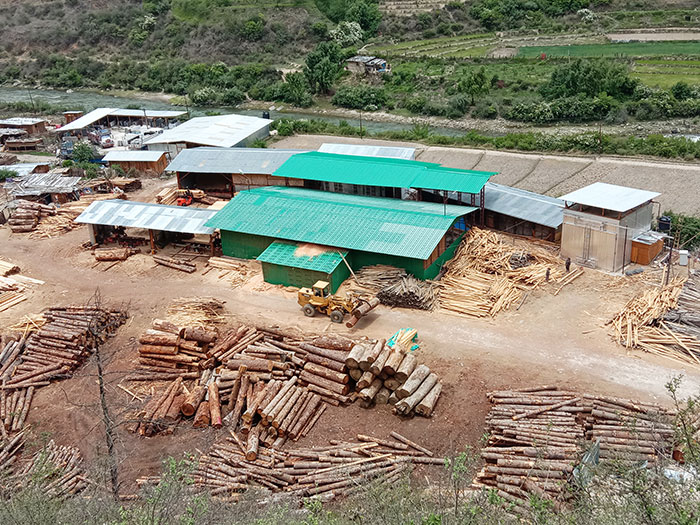Failure to comply will result in deregistration
Choki Wangmo
In an executive order issued earlier this month, Sanam Lyonpo (agriculture minister) Yeshey Penjor urged the stand-alone stationary sawmills to upgrade to integrated wood-based industry by December 31, 2022.
The failure to comply, according to the order, would result in deregistration of the sawmill, cancellation of licence by the economic affairs ministry, and debarment from monthly timber allotments by forest department.
The forest department is directed to stop issuing forestry clearance for new stand-alone stationary sawmill licence and facilitate the establishment of integrated wood-based industry with existing sawmills.
Following the government’s plan to rebuild the economy from Covid-19 losses by exploring measures to export wood-based products, the agriculture and forests ministry submitted a review report to the Cabinet last year. The measures are expected to save the government Nu 3 billion from imports.
The report included the export potential for semi-finished and finished wood products, end-to-end supply chain of wood-based industries, and possible import substitution for wood-based products.
The ministry submitted a recommendation to upgrade the standalone sawmills to integrated wood-based industries, among others.
The upgradation of stand-alone stationary sawmills into integrated wood-based industry is expected not only to address the issues of huge timber wastage through enhanced value addition but also help in creating employment opportunities.
The existing integrated wood-based industries are found to minimise wastage using advanced technologies or machinery such as finger jointing machine, panelling machine, planning machine, CNC-Router, and seasoning kiln.
Although the government’s initiative was well received by the Association of Wood-Based Industries (AWBI), they shared financial concerns in upgrading the sawmills.
AWBI President Phuntsho Wangdi said that the association, a few years ago appealed to the ministry to enforce integrated wood-based industry to reduce imports and resource wastage.
He said that most of the sawmills in the country focused on producing sawed timber without value addition, while the market was flooded with imported wood-based products. “Integrated wood-based industry would help minimise wastage of scarce resources and reduce imports of wood products.”
He said that, in the absence of foreign workers due to Covid-19 border closure, most of the sawmills remained shut. “We can avoid such situations in the future and employ Bhutanese people in the industry, which can be achieved through an integrated industry.”
The slowdown in the construction industry has resulted in a decrease in demand for construction timber that has affected the internal consumption of the timber in sawn form.
Phuntsho Wangdi, however, said that it would be difficult for the stand-alone sawmills to upgrade, considering the cost involved. He said that most of the sawmills used machines imported from India in the 1960s which cost about Nu 0.5 million (M). The upgrade would cost at least Nu 4M.
If the government could introduce preferential loans at low-interest rates for such businesses, it would help us, he said. “Instead of revoking the licence, financial supports, fiscal incentives, and tax exemptions should be introduced so that we can upgrade gradually.”
There are no sawmills in the east and central parts of the country. Phuntsho Wangdi said that introduction of integrated wood-based industry would encourage people to start such businesses.
There are about 150 members registered with the association, out of which 100 are stand-alone sawmills. There are four ply industries, which import about 99 percent of the resources.
Currently, there are 136 sawmills—16 mobile sawmills and eight integrated wood processing units in the country.


